Stanley Marcus, 96; Shaped Store Into Icon of Opulence
- Share via
Stanley Marcus, a Harvard MBA graduate who turned a family-run women’s apparel store into a pioneer of high-end retailing and extravagant gift-giving, died Tuesday in Dallas. He was 96.
The chairman emeritus of Neiman Marcus, a company synonymous with opulence and highbrow tastes, was hospitalized Sunday and died with family members at his side, a spokeswoman for Stanley Marcus Consultancy told the Associated Press.
His daughter, Jerrie Smith, told the Dallas Morning News that Marcus died of “old age” at Zale Lipshy University Hospital. “He died gently,” she said.
Known as the “merchant prince of Texas,” Marcus spent 50 years at Neiman Marcus, shaping fashion and retail trends while helping transform Dallas from its early rough-and-tumble image into an international shopping destination. In 1938, Marcus originated the Neiman Marcus Awards, considered the Oscars of fashion, introducing what are now household names such as Christian Dior and Muccia Prada.
Marcus, fondly known to employees as “Mr. Stanley,” kept a simple philosophy for the business: “I do believe the best is discernible to the observant eye.”
Of German and Jewish descent, Marcus was born in Dallas on April 20, 1905, to Minnie and Herbert Marcus, who along with his sister and brother-in-law, Carrie and Al Neiman, opened their first store in downtown Dallas in 1907 with $25,000 from the sale of a sales promotion business.
Marcus began working at the store in 1926, shortly after receiving his master’s degree in business administration from Harvard’s business school. Twenty-one years old at the time, his first duties including working as a salesman in the store’s women’s apparel section.
It was during his first year at the store that he introduced weekly fashion shows, the first of its kind by a department store in the United States and the first of a number of pioneering moves by the legendary retailer. The oldest of four children, Marcus eventually rose through the ranks, getting promoted to secretary, treasurer and director of the company, a new position that included managing the sportswear shop. In 1949, Marcus was named president of the company as it launched its boldest move yet to open a branch store in suburban Dallas.
Under Marcus’ direction, Neiman Marcus was the first to offer personalized gift wrapping for customers and started a Christmas tradition of selling exotic his-and-her gifts, which continues today. The first his-and-hers category debuted in the 196Os with a pair of Beechcraft airplanes.
The company was the first retail apparel store outside New York to advertise in national fashion magazines and in 1953 prompted Vogue magazine to describe the store as “Texas with a French accent.” Indeed, early Neiman Marcus customers included cowboys, Indians and women from rural outposts where land had yielded oil and newfound wealth.
“As far back as 1934, Marcus realized that his greatest competition was from leading retailers in New York and San Francisco,” the American Advertising Federation said as it inducted Marcus into the Advertising Hall of Fame in 2000. “Defying conventional wisdom, he boldly pursued a national advertising campaign for his local store with two ads in Vogue and in Harper’s.”
Today, the company operates 32 Neiman Marcus stores nationwide, from Beverly Hills to Honolulu, as well as two Bergdorf Goodman stores in New York. It also publishes a popular catalog that has featured custom-made Lexus convertibles, a helicopter in Neiman Marcus colors and $2.5-million necklaces.
For a man who sold extravagance, his tastes were pragmatic and simple. Asked a few years ago to define elegance, Marcus replied: “It’s the antithesis of sumptuousness. It’s understanding that what is right for one occasion at 8 o’clock in the morning is wrong for 8 o’clock at night. If you visit airports, particularly, you see the antithesis of elegance. People wear everything from bikinis to sleeveless tank tops.... I think a sense of appropriateness is probably the best qualification for elegance.”
Although Marcus had retired from the company in 1975, he continued to provide business advice and consultation, working five days a week and showing up at his office wearing custom-made suits. He also founded his own publishing house, SomeSuch Press, and was an avid collector of miniature books.
Marcus is survived by his wife, Linda Cumber Robinson; a son, Richard; two daughters, Wendy Raymont and Jerrie Smith, along with numerous grandchildren and great-grandchildren.






